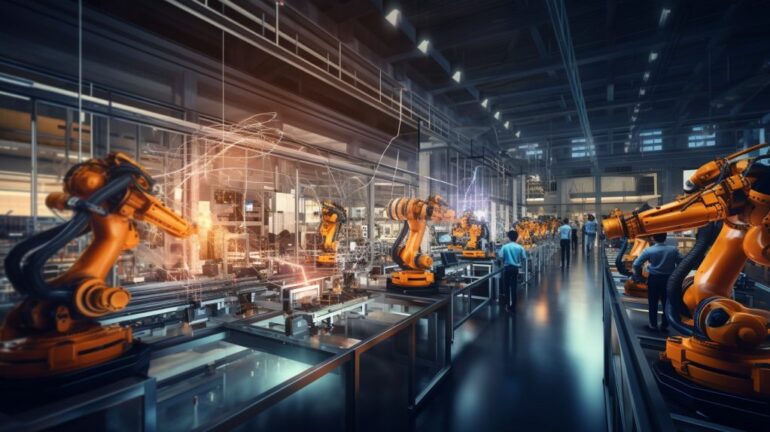TL;DR:
- Allie AI addresses the costly issue of factory downtime, which accounts for 11% of annual turnover, costing enterprises $1.5 trillion yearly.
- The founders, Alex Sandoval and Nicolas DeGiorgis, drew inspiration from outdated factory practices during the pandemic to create Allie AI.
- Allie AI offers a configurable hub that connects to factory machines and sensors, providing valuable insights.
- The platform enables root cause analyses, automates maintenance workflows, and introduces a chatbot-like assistant.
- Allie AI plans to focus on manufacturing sectors, such as cement, steel, food and beverage, plastics, and paper industries.
- The pandemic accelerated the adoption of cloud-based industrial operations, boosting Allie AI’s prospects.
Main AI News:
In the high-stakes world of manufacturing, factory downtime is akin to throwing money down the drain. Recent estimates suggest that this issue siphons off a whopping 11% of enterprise companies’ annual turnover, a staggering sum equating to nearly $1.5 trillion each year. This translates to an average of $129 million per facility among Fortune 500 companies, more than double the reported downtime costs for these giants in 2020.
So, what’s causing this pervasive and costly problem? The answer lies in the lack of a single, unified source of truth within factories, a void that robs them of the critical insights necessary for swift decision-making. The good news is that this challenge is being confronted head-on by visionary entrepreneurs Alex Sandoval and Nicolas DeGiorgis, who, inspired by their experiences at Rappi, the Latin America-based delivery app, co-founded Allie AI.
Allie AI, recently showcased at the TechCrunch Disrupt Battlefield competition, is poised to redefine industrial and manufacturing sectors by introducing advanced monitoring and analysis of factory data. It bridges the visibility gap that has long plagued these industries, offering a level of insight previously unattainable.
The journey began during the pandemic when Sandoval was asked to advise a family friend’s factory digitization project. What he discovered was startling: basic statistics such as efficiency and machine monitoring were still being tracked using pen and paper, a shockingly archaic practice. This revelation led to the birth of Allie AI.
Allie’s mission is clear: consolidate industrial data by leveraging modeling techniques and combine it with an intuitive dashboard designed for factory operators and managers. The end result is improved efficiency. Starting as a proof of concept, Allie AI quickly garnered $2.3 million in venture capital support.
Factory operations typically suffer from disconnected data spread across various systems. Allie addresses this by providing a configurable hub that connects to machines and sensors, both old and new, within a factory. This digital layer overlays the factory’s processes and hardware, identifying key factors tied to productivity, quality, costs, and machine health, all securely stored in the cloud.
Allie doesn’t stop at data aggregation; it empowers factories to run root cause analyses, considering metrics like operational efficiency, product wastage, and costs across production lines. Automation is at the heart of Allie’s approach, utilizing AI to predict machine failures and recommend preventative measures.
A recent addition to the Allie platform is a chatbot-like assistant, trained on productivity data, factory manuals, and procedure documentation. This assistant can provide information on frequent component failures and step-by-step instructions for preventive maintenance tasks.
Sandoval emphasizes that Allie becomes more intelligent with every use, thanks to its model that tags every report and root cause. This wealth of knowledge enables customers to make correlations between machine variables and failure types, ultimately helping them take well-informed actions.
While Allie AI faces competition in the realm of digitizing factory data, its go-to-market strategy sets it apart. Initially targeting manufacturing customers in cement, steel, food and beverage, plastics, and paper industries, Allie aims to fortify its technology, particularly the recommendation engine that underpins its platform.
Sandoval is confident about Allie’s trajectory, as it already collaborates with 30 of the largest industrial facilities in the Americas, manufacturing products worth a staggering $30 billion annually. The pandemic, albeit challenging, catalyzed the shift towards cloud-based industrial operations, expanding IT budgets for industrial players—a trend that bodes well for Allie AI.
As Lucas Limas from Caravela Capital, an Allie investor, aptly puts it, “We believe the time for Allie is now.” With a strong migration of industrial operations from China to Mexico, a key market for Allie, the future looks promising for this groundbreaking venture that’s rapidly gaining traction among the leading manufacturers in the region.
Conclusion:
Allie AI’s innovative approach to tackling factory downtime and optimizing operations holds immense promise. Its ability to centralize and analyze factory data, predict machine failures, and provide actionable insights will significantly impact the market by enhancing productivity and reducing costs for manufacturing industries. The pandemic-induced shift towards cloud-based operations further solidifies Allie AI’s position as a valuable asset in the evolving industrial landscape.

